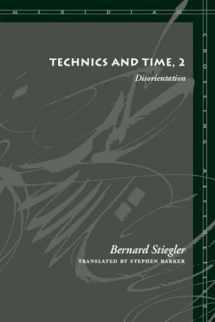
Technics and Time, 2: Disorientation (Meridian: Crossing Aesthetics)
ISBN-13:
9780804730143
ISBN-10:
0804730148
Edition:
1
Author:
Bernard Stiegler
Publication date:
2008
Publisher:
Stanford University Press
Format:
Paperback
286 pages
Category:
Movements
,
Social Sciences
,
Philosophy
FREE US shipping
on ALL non-marketplace orders
Rent
35 days
Due Jun 09, 2024
35 days
from $16.78
USD
Marketplace
from $25.81
USD
Marketplace offers
Seller
Condition
Note
Seller
Condition
Used - Good
Book details
ISBN-13:
9780804730143
ISBN-10:
0804730148
Edition:
1
Author:
Bernard Stiegler
Publication date:
2008
Publisher:
Stanford University Press
Format:
Paperback
286 pages
Category:
Movements
,
Social Sciences
,
Philosophy
Summary
Technics and Time, 2: Disorientation (Meridian: Crossing Aesthetics) (ISBN-13: 9780804730143 and ISBN-10: 0804730148), written by authors
Bernard Stiegler, was published by Stanford University Press in 2008.
With an overall rating of 3.6 stars, it's a notable title among other
Movements
(Social Sciences, Philosophy) books. You can easily purchase or rent Technics and Time, 2: Disorientation (Meridian: Crossing Aesthetics) (Paperback) from BooksRun,
along with many other new and used
Movements
books
and textbooks.
And, if you're looking to sell your copy, our current buyback offer is $4.75.
Description
Disorientation is the first publication in English of the second volume of Technics and Time, in which French philosopher Bernard Stiegler engages in a close dialogue with Husserl, Derrida, and other philosophers who have devoted their energies to technics, such as Heidegger and Simondon.The author's broad intent is to respond to Western philosophy's historical exclusion of technics and techniques from its metaphysical questionings, and in so doing to rescue critical and philosophical thinking. For many years, Stiegler has explored the origins and philosophical, ethical, and political stakes of a global process he calls "the industrial temporalization of consciousness." Here, demonstrating that technology—including alphabetical writing—is memory, he argues that through new technologies of retention and inscription we have come to live in a world where time devours space, a disoriented world in which we have lost our bearings. Immersed in the multimedia of an over-connected world, with time and space as we know them abolished, we no longer find "cardinal points" to guide us and may even be led where we do not wish to go. We must therefore prepare to confront new spheres of ideological control and discover new possibilities in the digital environment.


We would LOVE it if you could help us and other readers by reviewing the book
Book review

Congratulations! We have received your book review.
{user}
{createdAt}
by {truncated_author}




